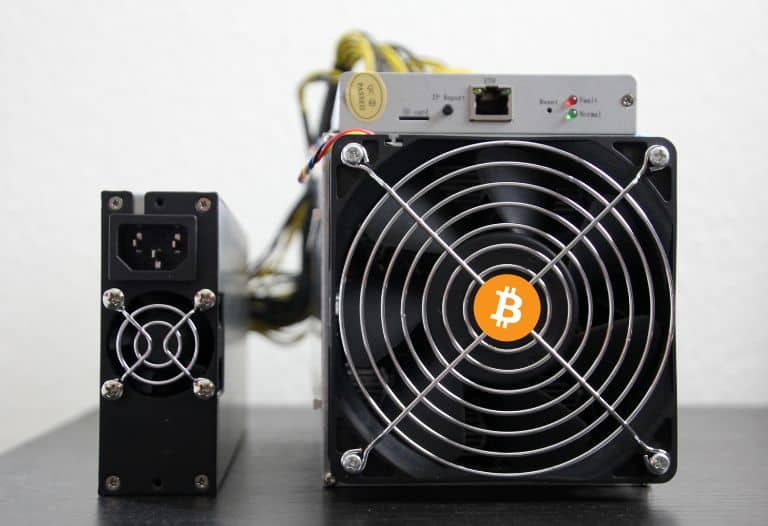
Table of Contents
ToggleThe birth of Bitcoin revolutionized an industry that not all of us have been aware of, that of graphics or video cards. They were in charge of mining cryptocurrencies. Subsequently, the relentless advance gave us ASIC miners, who took over bitcoin mining.
Tasked with fulfilling a single task, solving specific mining algorithms, such as Bitcoin’s SHA-256, they were bought in huge quantities and piled up in mining farms that are responsible for bringing new units of the first cryptocurrency into the world.
While, the green energy focused movement has taken away part of their source of work, Bitcoin or Litecoin are still options for these types of miners. But, let’s leave the introductions aside and find out what these famous ASIC miners are all about.
What is an ASIC miner?
An ASIC miner, an acronym that stands for application-specific integrated circuit, is a device designed to solve the algorithms needed to mine cryptocurrencies.
It is important to highlight, that an ASIC is designed to solve the algorithm of a particular currency. We can find Bitcoin, Litecoin or Ethereum miners. This specification allows them:
- Efficiency in the use of your hardware resources
- Energy savings
- Faster algorithm resolution speed
The introduction of this type of hardware for mining cryptocurrencies was undoubtedly a revolutionary development. Let’s take a look at some of its history.
Pre-ASIC mining
While developing Bitcoin, Satoshi Nakamoto wished that anyone with a “simple” computer could participate in the mining process. In the ideals of this anonymous revolutionary, a cell phone or home computer would be enough to validate transactions, generate new blocks and mine BTC.
The reality is that, at first, homemade CPU chips were capable of the task. Then, as the blockchain grew in popularity, GPUs or graphics cards began to monopolize the task. So video game players found that their main tool rose in price due to this growing demand.
The arrival of ASIC miners
Well past its fourth year of life, Bitcoin found new hardware as a means to see each new unit reach the world after being mined. Beyond the superior power of its chips compared to that of a CPU or GPU, the difference is clear:
- ASIC miners are created exclusively for solving an algorithm
Its arrival made the use of CPUs/GPUs for mining BTC almost obsolete and mining farms became populated with this type of hardware.
Luckily for them, and unluckily for gamers, GPUs continued to mine other currencies, such as ETH. Even some blockchains, have been created specifically to disallow mining with ASICs and avoid centralizing this task, as the high cost of these miners tends to centralize the activity.
How do ASIC miners work?
After having defined them, their operation is really “simple”. Once the mining software corresponding to the coin to be mined has been downloaded, the mining equipment begins its work.
The work consists of “launching” resolutions, in a random way, for the algorithms that the networks propose for the mining of its next block. Once the algorithm has been solved, after finding the resolution to this mathematical problem, the block will be added to the chain and the new bitcoins mined.
The complexity of the Bitcoin algorithm has grown, accompanying advances in the hardware that solves it, in order to maintain a mining time of 10 minutes. Today it is very difficult, almost utopian, to mine BTC alone. Therefore, miners often pool the power of their mining units to gain chances to mine a block, in mining pools.

The cost of an ASIC miner
The cost of ASIC miners is usually one of the main barriers for those who want to get into BTC mining. To get an idea, an Antminer S19 ASIC, one of the best performing when it comes to mining BTC, is around $2,400 today.
After the premium model, we come across a more economical one, something like the base of the S19 and has a cost of about $1,785, which is still prohibitive for most of society.
Subsequently, we have one more option. The AntminerT17+ costs just over $800, presenting itself as an interesting alternative. In any case it must be understood that, at a lower price:
- Less possibilities to mine a block (less hashing power)
- Lower efficiency, therefore more energy usage
With a cheaper miner, we will be able to start with the task more easily, but its disadvantages must be taken into account in the previous budget. Higher electricity costs and lower rewards delay the recovery of the initial investment.
Disadvantages of an ASIC miner
So far, I have told you all the good things about ASIC miners, but these impressive pieces of hardware also have their downside. Their main problems, we can say, are three:
- They are closed systems, which do not allow upgrades.
- High cost and low market availability
- Short useful life
As soon as the algorithms of the currency in question are modified, the ASIC miner will have passed into obsolescence.
Now, as we have already reviewed in the previous point, their cost is extremely high, which hinders their adoption by ordinary users and invites the centralization of mining activity.
Finally, the useful life of these miners usually does not exceed 12 months. So, in this sense, not only obsolescence attacks them because of their characteristic of not allowing updates, but also because of the duration of this piece of hardware.

Conclusions
This article presents a first approach to ASIC miners. Although we can still delve deeper into how they work, we are now in a position to understand whether or not we should continue to be interested in these unique pieces of hardware.
Evidently, technological evolution is unstoppable and Satoshi’s dream of anyone being able to mine bitcoin from home is no longer possible. Once again, it is evident that scientific advances can benefit us with certain features, but harm us with others.
Increased speed and energy efficiency are set against extremely high prices that push for a centralization of bitcoin mining. The steps forward in relation to these undesirable particularities for bitcoin have gone too far and are difficult to reverse. From our place, we hope that the new advances in technology, contemplate our “cypherpunk” spirit.








